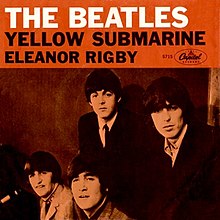Our website is made possible by displaying online advertisements to our visitors.
Please consider supporting us by disabling your ad blocker.
Eleanor Rigby
| "Eleanor Rigby" | ||||
|---|---|---|---|---|
 US picture sleeve | ||||
| Single by the Beatles | ||||
| from the album Revolver | ||||
| A-side | "Yellow Submarine" (double A-side) | |||
| Released | 5 August 1966 | |||
| Recorded | 28–29 April & 6 June 1966 | |||
| Studio | EMI, London | |||
| Genre | Baroque pop,[1] art rock[2] | |||
| Length | 2:08 | |||
| Label | Parlophone (UK), Capitol (US) | |||
| Songwriter(s) | Lennon–McCartney | |||
| Producer(s) | George Martin | |||
| The Beatles singles chronology | ||||
| ||||
| Music video | ||||
| "Eleanor Rigby" on YouTube | ||||
"Eleanor Rigby" is a song by the English rock band the Beatles from their 1966 album Revolver. It was also issued on a double A-side single, paired with "Yellow Submarine". Credited to the Lennon–McCartney songwriting partnership, the song is one of only a few in which John Lennon and Paul McCartney later disputed primary authorship.[3] Eyewitness testimony from several independent sources, including George Martin and Pete Shotton, supports McCartney's claim to authorship.[4]
"Eleanor Rigby" continued the transformation of the Beatles from a mainly rock and roll and pop-oriented act to a more experimental, studio-based band. With a string octet arrangement by George Martin and lyrics providing a narrative on loneliness, it broke sharply with popular music conventions, both musically and lyrically.[5] The song topped singles charts in Australia, Belgium, Canada, and New Zealand.
- ^ Stanley, Bob (20 September 2007). "Pop: Baroque and a soft place". The Guardian. Film & music section, p. 8. Archived from the original on 21 September 2013. Retrieved 4 February 2013.
- ^ Rodriguez 2012, p. 138.
- ^ Weber 2016, p. 95: "One of the rare songs in which primary authorship is disputed is 'Eleanor Rigby' ..."
- ^ Weber 2016, p. 96: "... [T]here is eyewitness testimony from at least four separate and independent sources, [including Martin, William Burroughs, Donovan and Shotton,] all of whom support McCartney's claim to authorship."
- ^ Campbell & Brody 2008, pp. 172–73.
Previous Page Next Page


